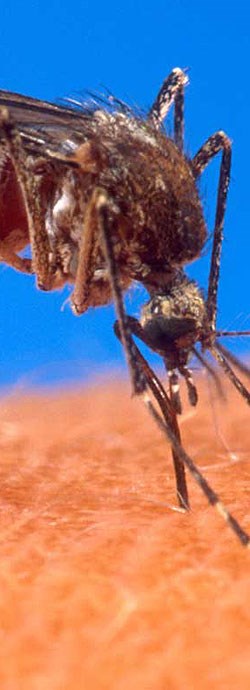HEALTH TRAVEL ADVISORY
PUBLIC HEALTH AGENCY OF CANADA
*********************** Malaria on Great Exuma Island in the Bahamas
The Public Health Agency of Canada (PHAC) is closely monitoring an outbreak of P. falciparum malaria on the island of Great Exuma in the Bahamas and reports of malaria in tourists who have visited Great Exuma.
The agency has been notified of one lab-confirmed case of P. falciparum malaria in a Canadian traveller.
In addition, the United States has also reported one case in a returning traveller.
Both of these cases traveled to Great Exuma.
As of June 14, 2006, 16 confirmed cases of malaria have been detected during the past week.
All 16 cases occurred in Bahamian residents.
None of the patients reported recent travel to places where malaria is endemic.
Malaria is not endemic to the Bahamas.
In 2005, only one case was reported and no cases had been reported during the five previous years.
The Ministry of Health along with other ministries are conducting active case detection and treatment; vector control including insecticide spraying, larviciding, and source reduction; and health education of the local population.
Technical assistance is being provided by the Caribbean Epidemiology Center (CAREC) and the Pan American Health Organization (PAHO).
Malaria is an acute flu-like illness caused by one of four species of parasite of the genus Plasmodium; Plasmodium falciparum, Plasmodium vivax, Plasmodium ovale and Plasmodium malariae.
Infection with P. falciparum malaria can be fatal.
The disease is most commonly transmitted to humans through the bite of an infected mosquito, specifically the female Anopheles mosquito, a dusk-to-dawn biter.
Malaria is endemic (i.e., constantly present) in most of sub-Saharan Africa; in large areas of the Middle East, South Asia, South East Asia, Oceania, Haiti, Central and South America; and in parts of Mexico, North Africa and the Dominican Republic.
For comprehensive information, please click here.
Recommendations
The Public Health Agency of Canada recommends the use of antimalarial medication and personal insect protective measures (e.g., repellants) against mosquito bites for travel to Great Exuma, in the Bahamas.
How to prevent malaria infection Two important measures can help you prevent malaria infection: avoiding mosquito bites and using effective antimalarial medications.
Personal measures to avoid mosquitoes
Female Anopheles mosquitoes bite mainly during the evening and night. Using personal insect protective measures will reduce your risk of being bitten by these mosquitoes.
- stay in well-screened or completely enclosed, air-conditioned accommodation
- sleep under insecticide-treated bed nets
- wear clothing that reduces the amount of exposed skin; wear long-sleeved shirts (tightly weaved material, sleeves down, buttoned/zipped up, tucked into pants) and long pants (tucked into socks or footwear)
- light-coloured clothing may be less attractive to some mosquitoes and make mosquitoes more noticeable
- use DEET-based products as repellents on exposed skin. The higher the concentration of DEET in the repellent formulation, the longer the duration of protection. However, this relation reaches a plateau at about 30 percent to 35 percent. DEET formulations that are "extended duration" (ED), such as polymers, are generally considered to provide longer protection times, and may be associated with less DEET absorption. Formulations over 30 percent are not currently available in Canada, although they are available internationally, including in the United States. It should be noted, however, that products sold outside Canada have not been evaluated by Health Canada. Most repellents containing "natural" products are effective for shorter durations than DEET and for this reason are not considered the preferred products for protecting against mosquito bites.
- regulatory agencies in western nations may differ regarding the recommended maximum concentration and application rates of DEET, especially for children. The Committee to Advise on Tropical Medicine and Travel (CATMAT) is satisfied that, for travel outside of Canada where the risk of malaria outweighs the risk of any important adverse reaction to DEET, the threshold for use of DEET should be low.
- CATMAT recommends that concentrations of DEET up to 35% can be used by any age group.
- for children, alternative personal protective measures, such as mosquito nets treated with insecticide, should be the first line of defense, especially for infants less than 6 months of age. Portable mosquito nets, including self-standing nets, placed over a car seat, a crib, playpen, or stroller help protect against mosquitoes. However, as a complement to the other methods of protection, the judicious use of DEET should be considered for children of any age. Recent medical literature from Canada suggests that DEET does not pose a significant or substantial extra risk to infants and children.
- DEET/sunscreen combination products are not generally recommended, because DEET can decrease the efficacy of sunscreens. As well, sunscreens should be used liberally and often while DEET should be used sparingly and only as often as required. If application of both is necessary, the Canadian Dermatology Association recommends that the sunscreen be applied first and allowed to penetrate the skin for 20 minutes, prior to applying DEET.
